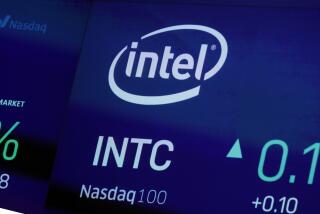Intel to Invest $1 Billion in Asia for Plants, Equipment
The world’s largest computer chip maker, Intel Corp. on Monday said it will invest $1 billion in plants and equipment in Asia and buy $1 billion of products from South Korea this year.
The investments reflect Intel’s belief that Asia will remain one of the fastest-growing markets for personal computers. The company sees “major growth in PC usage,” in Asia, Intel President and Chief Operating Officer Craig Barrett said in Seoul during a trip through the region.
Intel shares fell $1.50 to close at $77.38 on Nasdaq. Shares of Palo Alto-based Hewlett-Packard Co. rose 31 cents to close at $63.13 on the New York Stock Exchange.
Barrett’s comments follow Hewlett-Packard’s disclosure Saturday that it will invest $300 million in South Korea. Although Asian companies have curtailed capital spending, especially in South Korea, U.S. technology companies see Asia as a key market for long-term profit growth. Falling Asian currencies also make it cheaper for U.S. companies to invest there.
“This is a vote of confidence in the Asian economies because companies like Intel and HP are not significantly curtailing their investments in Asia,” said analyst Daniel Scovel at Fahnestock & Co. “Fundamentally nothing has changed about why companies went to those markets in the first place,” he said.
For example, PC shipments to China rose 40% last year to 2 million, Scovel said. Although that’s a small chunk of the 80 million units shipped last year, it’s the fastest-growing market.
The $1 billion Intel said it will invest in Asia is 19% of the $5.3 billion it expects to pay this year in capital spending worldwide.
Santa Clara-based Intel also plans to buy $1 billion of chips and other products and services from South Korean companies this year, a move that may help hold down costs.
More to Read
Inside the business of entertainment
The Wide Shot brings you news, analysis and insights on everything from streaming wars to production — and what it all means for the future.
You may occasionally receive promotional content from the Los Angeles Times.










